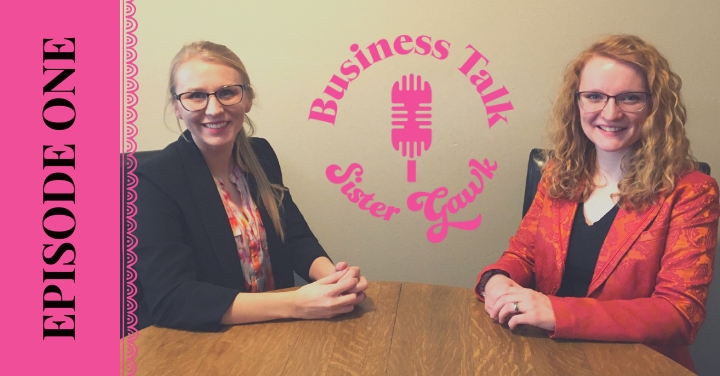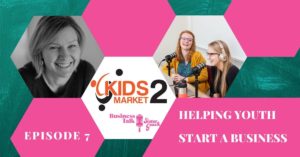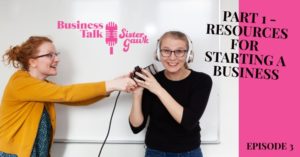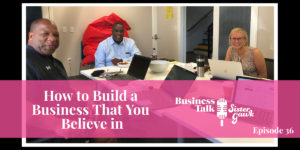In our very first episode, we talk a little bit about how what you can expect from us and discuss how to prepare the branding of your business.
Branding at a glance:
- Consistency is very important as you create your band
- Define your core values so that all of your content flows from this expectation
- Knowing what you’re good at can help you understand the strengths of your business growth and future strategy
- When setting up your business, get online to the major listing websites (Bing, Google, Facebook, & Yelp)
- Have a target audience and do some market research
Start listening to get the whole scoop!
Bekkah: We are sisters that enjoy business thoroughly and what we do in this podcast is talk about why not only we love business, but why you should try business for yourself. Whether it’s starting something on the side, or launching full-blown into a big brick and mortar building. Whatever it is we want to talk about it and learn how to do it easily with lower risk than you imagined possible.
Ruthie: Basically, the gist of it is that we want to demystify business for you. We like to address questions you have and give you the tools to unpack what entrepreneurship is, what business is, and basically turn your passion into profit.
Bekkah: The structure of our podcast is first our business talk and then after that we gawk about something together. The definition of gawk is “to stare openly and stupidly”. Whether that’s telling you a little bit about something embarrassing that happened to us, something we find really interesting, discussing fun things that are interesting in the world around us, or something you’ve shared with us that we think is pretty hilarious. We’re gonna talk about that at the end so check out the end of our audio recording for those stories.
We are going to offer you educational tools and tips. We are also going to interview entrepreneurs and talk about, specifically, what it is that they do, why do they do it, and how did they do it? We want to know the nitty-gritty details of how they went about getting their passion started and if someone else was to do this, in a different area, what would that look like? We also will ask, “What advice would you have for them?”, “What are the resources available?” all that kind of stuff and more. We will waffle back and forth between those two, segment styles in our episodes. Coming up we have a four-part series on different tools and tips that we would recommend if you’re looking to start a business for yourself. Things to help you get organized and stay on track.
Ruthie: The format of our podcast is 20 minutes that we’ll be posting on Fridays.
Bekkah: We are going to be real. We’re going to have some fun. Today we are talking about branding. The reason we wanted to talk about that first is because we’ve been doing a lot of it to get ready for this podcast launch; what it takes to brand yourself, your business, and what that looks like as you’re getting started.
One of the things that we recommend people start while looking at a business or doing consulting is: think about your core values. What is it that makes you not only valuable but what do you find as important? What do you believe in? The core values we chose for this podcast are to educate, collaborate, with our listeners as well as other entrepreneurs, inquire, explore new things. Because that is how you grow, when you learn things, whether you succeed or fail, you learn something from it and we want to be able to share that with you. Especially, the failures so you don’t do them as well.
Ruthie: What’s important about this and defining this for your business is that you can come back to that every single decision you make. Ask, “Is this consistent with our core values?” Whether that’s attending a certain event, posting something on your website, or hiring someone you – come back to your core values every time. Is this consistent with who we are as a company? Then it’s not so much an argument of whether or not you should do it. It is a question of whether of not this consistent with our core values. If it is, then you can have more discussion about that but it always starts with the core values.
Bekkah: And obviously, the next question you should probably ask is is this profitable? Just because it’s consistent, doesn’t necessarily mean that you should spend a bunch of money on it and get no return. A lot of people think specifically about a logo when you say your brand. You think of those name brands that are all in your house or clothes you wear that kind of stuff. But, actually, branding is so much more than that. Google “brand manual”, you can find some really cool examples. Here is an article that breaks down very well how to craft your own brand manual
Universities are known to have some really cool ones. Their tone, their core values, different fonts, the logos that they use, and then the subsets of departments. There are so many things and as you grow as a business, you’re probably going to get more into the nitty-gritty of that. We want our tone to stay consistent in our branding. We want to have fun. We know that we want to be educational, but we don’t want to be boring, right? Think about what your brand is and how are you communicating that. It’s really important to be consistent on every single platform that you are representing yourself in.
As a business, you want to be showing up places on the internet and elsewhere. If you are starting a business, four
places online that we would recommend you work on getting visibility on is: a Google business listing, Bing business listing, for some of you who don’t know what Bing is – it’s another search engine by Microsoft, you should have a Facebook page, and a Yelp listing. You need the exposure and you want to get reviews. All those are free, by the way. It should have your website, business hours, contact information, photos of that represent your core vales and thinge like that.
We’re not going do that for our podcast because, we actually own our own businesses, the podcast is, honestly, more for fun. But we are going to try ways to make money on it. We will let you know about those and say, “Hey, this is what’s really working.” Or, “This is what we tried and this is how we did sponsorships or whatever.” Because we want it to be free for you guys to listen to. We’re going to try different things so if you’re interested in being an entrepreneur in podcasting this would be a great place to learn a few things about that.
Ruthie: Going back to being present online, it’s good not only to have consistency in the voice of your branding but it’s also good to be consistent in the content that you’re producing. For instance, your phone numbers and addresses should be consistent. If you have a listing on Yelp with a different phone number than what you have on Facebook then when Google crawls the website looking for if someone searches say “business talk sister gawk” and we have different phone numbers or different addresses listed, Google sees it as inconsistency. This will actually de-rank you in search results because it sees you as an incredible source. It’s really important to have that consistency across platforms.
Bekkah: As you can see, we are kind of nerds about digital marketing. Some of the stuff will share throughout out episodes may be useful for you in that regard. We also love talking with people who are experts in other areas within the business world. When we are talking about consistency if you are thinking “Oh, well, I am just starting out and I don’t have a lot of money!” Listen to the next four podcasts of ours. They are all about tools you can utilize for your phone number, meeting with people, getting your name out there, and much more. There are tons of things that you can utilize without spending a dime.
Within branding, we want to talk about your target market. You could break this down into specific demographic information. A lot of these words might be new to you. What does demographic mean? It’s talking about who that person is; their habits and interests. You can find data on what region are you targeting to, what area do they live in. You can find data from the Census Bureau on how much that person makes or the average family size. What area are you looking into you? Or maybe you’re doing something for the entire United States and you can really dig into a specific target category.
One time I really dug into the demographic information and the target market for specifically librarians. First of all, I love librarians so that was already a great time, but I learned a lot of stuff about them. They love quotes, they are really into books, spoiler. There’s a hashtag on Instagram called #LibrariansOfInstagram. Look it up, seriously. They really like cats. Bibliophiles is a hashtag they use. There are tons of different things that you can look up about a demographic.
In my study of librarians which is not a ton but enough to know they really like tea! Maybe it’s because they also really enjoy great expectations and Pride and Prejudice and Charles Dickens’s classical reading. They appreciate older works of literature. There are tons of things you can learn about a specific target market if you’re saying, “I really want to know more about how to get my business in front of these people.” If you do all of your branding to target them, you’re going to get them! They’re going to be engaged and when you hit it right, you’re gonna see great success. But I will say that if you’re going to do marketing and branding, you’re going to also have to do sales. Some people don’t like sales because it’s uncomfortable. I don’t know if you guys know this about Ruthie but one of her favorite thing to do is to go door-to-door and sell stuff.
Ruthie: When I know a lot about the product that I’m selling. That’s something important too with your business. You have to be passionate about what you’re doing. You have to be passionate about whatever it is that you are pursuing even before you start pursuing it. Then it’s so much easier for me to promote. One thing I love is door-to-door fundraising. That is so enjoyable to me and a lot of people think, “That sounds terrifying! Talking to strangers over and over again!? That sounds horrible! Literally nightmare material”, but I love that. That’s my bread and butter so, but for me, I have to know the product. I have to know the cause. I have to know what I’m doing to feel comfortable doing it. So get yourself well versed in what you’re doing and why you’re doing it.
You can’t expect anyone else to be excited about your product or business if you aren’t excited and you can’t be discouraged if others aren’t as excited as you are. That also comes back to core values because it’s easy to find your “why” and sell that when you know what the core of your idea is. Another good thing to do is formulate a mission statement that complements your core values.
Bekkah: Our mission is to demystify business which we have listed on our website for our audience to see. We want to talk about how easy it is to set up a business and get this stuff done. A lot of times, I’ve seen people, especially, within the marketing world say, “Oh well, you need this to be successful.” For example, a brand manual is something they often recommend. If you search online, especially, for really big businesses like General Mills or Cargill, I’m sure they have tons of information on their brand and they probably spent. upwards of $50,000 on that, but you don’t have to have anything extravagant to get your branding consistent.
Those huge companies have an entire in-house team that gets paid full time to do that. A lot of people think, “Oh that’s so scary!” But the reality is, a lot of the stuff that they’re doing is really not rocket science. It’s just that they’re way bigger than a solo entrepreneur starting out. A lot of that stuff that they’re doing you can do, too! It just takes time and a lot of bigger businesses don’t have that kind of time. When you are just starting out, you have loads of time but maybe not a lot of money. That’s where really understanding this stuff for yourself and getting educated from the beginning it’s going to help you, in the long run, to make better decisions about who to hire as a subcontractor. Or as a different business giving you a service when you know it’s not worth your time to do it yourself.
I know that there are certain things that I am just not willing to invest the time in to do myself. One of those things was our logo. I knew that someone else who’s a graphic designer would be well versed in that and would do a better job rather than doing it with free software. But I could do it with the free software if I was trying to get cheaper, but, in this case, it was worth the investment for us to pursue connecting with a graphic designer to do that.
Ruthie: I think one thing that’s especially important, as you’re starting out, is: teach yourself to be a researcher. Every decision that you make, you research it. That is going to really cut down on a lot of the operating cost that you have because you’ve spent the time to research and find out if it is going to be a profitable decision for your business.
Bekkah: And even if you’re going to like it. There’s one thing to think, “This is really profitable. It’s going to make a ton of money,” but if you hate it – you shouldn’t be doing it. Entrepreneurship should be an enjoyable experience. Is it sometimes scary? Does it sometimes have hard difficulties? Mm-hmm. But it’s the journey through that where you learn things.
I think one thing we haven’t really talked enough withing branding is knowing who you are personally. You have your core values, you know you’re passionate about, but what are you actually good at. If you have ever taken personality tests, which by the way, you can get a lot of these for free online or go to your local library or your career force center. They have a ton of resources where you can say, “Hey! I really like this, I don’t like this.” Or, “I really like these conversations,” and are you an introvert or an extrovert? Are you this or this right? You can do all of that research to know, “Okay, here’s where I thrive, so what kind of job will I enjoy doing?” Maybe part of it is what you really enjoy and then the rest you’re saying, “Okay, I’m going to look for additional resources to supplement where I know I’m weak.” Ruthie and I did this for our podcast. I know I am NOT a detail-oriented person.
Ruthie: I know that I am.
Bekkah: And I appreciate that about her because if it’s something that I do over and over again it’s gonna drive me bonkers because I love doing new things learning new fun facts and Ruthie loves processes.
Ruthie: And I love consistency.
Bekkah: If she can do it yeah over and over again and make sure it looks good she thrives. Whereas I’m someone that feels like those tasks are sucking my brain away slowly. So, know that about yourself!
Ruthie: Ask your friends and your relatives, “What am I good at?” Not in a weird arrogant way, but really ask them, “If I were to pursue this, what do you think I would struggle with and what do you think I would really thrive at?” Take their feedback, analyze it, and think through it yourself. You don’t have to let it crush your soul or anything like that, but think through if they said that you’re really not good with numbers. Well then you should really take the time to research some accounting software, if you should get an accountant, if you should ask someone to help you with it, or you should really work more on that.
I really like The Strength Finders and their whole program. One thing they focus on is not necessarily taking someone’s weakness and trying to make it their strengths but focus on finding someone’s strengths and improving that strength. If you are not good at numbers, it doesn’t make sense for you to just keep beating yourself in the head trying to get better at numbers. If you’re really, really good with people then you get better and better and better at being good with people. Then you find some other resource that’s going to help you with numbers.
Bekkah: We love helping people figure out what their life trajectory is what they want to do. We want to have those conversations with you as well so if you would like to contact us you can do that through our website BusinessTalkSisterGawk.com as well as our Facebook page. Thinking about what you want in life and how can you plan for it? That is exactly what we love doing and giving you the tools to do that.
Thank you so much for tuning in for our very first episode! We are having a blast making those for you guys and can’t wait for what the future has in store. Check us out every Friday for new content!




